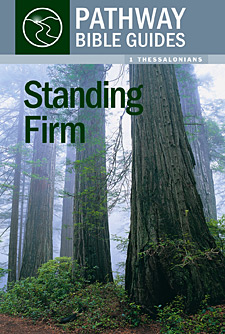I'll be upfront. Generally, I don't like pre-prepared Bible studies.
One of the reasons for this is the frustration that comes from trying to understand another author's intent. I was glad to see that Tony Payne doesn't recommend using them all the time either (Briefing 341, p8).
Using pre-prepared material is fine if it's part of your strategy for the year, but it cheats everyone if it ends up being your only strategy or your weekly diet.
It's important we recognise that the Matthias Media Pathway series of Bible guides are written with people of low literacy in mind and are also aimed at groups that haven't got an hour and a half to work through a more interactive study. So don't expect detailed word studies, links to interesting allusions or a thorough going biblical theology.
 That said, advantages of this series are that the studies get under way quickly and they encourage participants to keep going back to the Bible for answers. Bible teachers can rely on these studies to keep momentum and "cut to the chase'. I can see that they would be useful in many contexts such as a half-hour lunch break at work lead by a busy employee.
That said, advantages of this series are that the studies get under way quickly and they encourage participants to keep going back to the Bible for answers. Bible teachers can rely on these studies to keep momentum and "cut to the chase'. I can see that they would be useful in many contexts such as a half-hour lunch break at work lead by a busy employee.
I used the studies on 1 Thessalonians " Standing Firm and Genesis " Beginning with God over summer for personal Bible readings. Both worked well though I felt that the study guide on 1 Thessalonians stuck to the mandate of being "simple without being simplistic' more than the Genesis series.
While I acknowledge that teaching from the Old Testament is more complex than preparing a series from a NT epistle, I felt the Genesis study kept falling back into the "interactive genre' of Bible study guides. This was especially evident when each study came to its last question ("To Finish'). The questions used often raised new ideas and issues that would be difficult to resolve from such a direct, no fuss study of the passage.
Unless the leader is quite an experienced Bible teacher, the end of these studies might fall flat or leave people confused and frustrated that the problems raised weren't dealt with satisfactorily. On one occasion the final question just didn't make sense (at least to me): "Think of three examples from present experience of how God's curses have come about?'
 There were also occasions where participants were asked to observe narrative structure in Genesis (E.g. Genesis 6-9). Once again I felt this was out of place in this kind of study and very little was made of the significance of the narrative patterns anyway.
There were also occasions where participants were asked to observe narrative structure in Genesis (E.g. Genesis 6-9). Once again I felt this was out of place in this kind of study and very little was made of the significance of the narrative patterns anyway.
It should be noted that both study guides have appended notes to assist the leader which I often found helpful and of a high quality. However, the subject of prophecy in Standing Firm (1 Thes 5:20), needed to be clearer, perhaps offering a concrete example would help.
In view of what I have noted above I would commend these studies to non-theologically trained leaders as long they do not become solely reliant on them or retard their own preparation skills. I would also recommend these studies to people who have theological training. These studies will save you time and your knowledge of the Scriptures will enable you to easily fill out these "bare boat' charters of God's word.




















